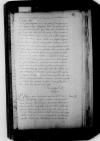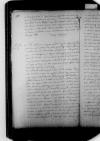Letter #424
Alfonso de VALDÉS to Ioannes DANTISCUSToledo, 1529-02-01
English register:
Valdés informs Dantiscus that all his friends are well except young Johannes Obernburger, who was close to dying but recovered. Some died of the same disease, Cortés is also ill and it is uncertain if he survives. The emperor is sticking to his plans [of traveling to Italy]. The pope was very ill and there was even talk of electing his successor. The French don’t like Rome [as the seat of the pope] because of the proximity of the imperial army. Valdés puts himself in the position of someone without real influence on events, a spectator in the theatrum mundi.
| received Valladolid, [1529-02-08] Manuscript sources:
Auxiliary sources:
Prints:
| ||||||||||||||||||||||||||
Text & apparatus & commentary Plain text Text & commentary Text & apparatus Excerpts concerning Dantiscus' travels
print 1 Clarissimo viro, Domino Ioanni Dantisco, serenissimi regis Poloniae oratori,
ms 1 2 omitted⌈Clarissimo viro, Domino
ms 1 2 omitted⌉
Salutem plurimam.
ms 1 2 Oberemburgem⌈Oberemburgensemprint 1 Oberemburgensem,
ms 1 2 Oberemburgem⌉
ms 1 2 morire,
ms 2 mori⌈morineprint 1 morine,
ms 1 2 morire,
ms 2 mori⌉
an vivere, ut nunc quidem res humanae reguntur.
ms 1 manus,
ms 2 munus⌈munusprint 1 munus,
ms 1 manus,
ms 2 munus⌉ a superis datum est, fabulae exitum exspectabimus.
Vale.
ms 1 1529,
ms 2 millesimo quingentesimo vigesimo nono⌈1529print 1 1529,
ms 1 1529,
ms 2 millesimo quingentesimo vigesimo nono⌉.
Tuus


 BK 222, No. 51, p. 194
BK 222, No. 51, p. 194